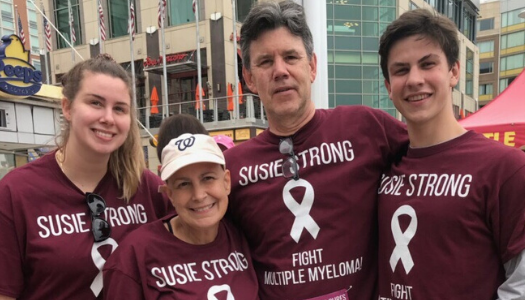Multiple Myeloma: A Rare But Very Real Cancer
On May 23, 2018, my mother, Susan Williams, was admitted to UNC Rex Hospital in our home town of Raleigh, North Carolina, after being told that some “abnormalities” had shown up in her blood test.
Several months earlier, my mom experienced excruciating pain around her rib cage and back that caused her to eventually become immobile. She met with multiple specialists to get opinions on what might be wrong. She was told it was probably a pulled muscle, maybe potential nerve damage, even osteoporosis. That is when we finally found out she had several fractures in her ribs, pelvis, and multiple crushed vertebrae. This explained the pain she endured.
However, It wasn’t until that day in May when we finally got the answer we had been waiting for. The dreadful diagnosis that would change our family and, more greatly, my mom’s life forever.
Multiple Myeloma is a cancer of the plasma cells which are white blood cells that help fight infection and are made in the bone marrow. The more of these cells that have myeloma, the more severe the symptoms are for patients; such as weak bones and a higher risk of infection— which often is what will lead to their demise.
There is currently no cure for Multiple Myeloma. There are standard treatment options available to help manage the progression. A common treatment is a Stem Cell Transplant or Bone Marrow Transplant, where patients are dosed with intense chemotherapy that will hopefully kill the myeloma cells and replace enough of them with healthy cells. The majority of Myeloma patients will only need to have this transplant once. My mother was an exception. She had to go through it twice. After transplant, patients will often try different maintenance chemotherapies until one keeps their myeloma cell counts low and manageable. Multiple Myeloma never reaches remission because the disease is always in the blood and most likely will come back. Again, there is no cure.
Learn more about Multiple Myeloma on NFCR’s blog here.
Spreading awareness about this disease is crucial because it is difficult to diagnose correctly let alone detect early. It is also hard to track how well patients will respond to treatments and if treatment will even work at all, which is a discouraging fate my mom has been faced with. There are still a lot of unknowns about this cancer and we need to support research to be able to answer those questions. Every day we constantly prepare for the worst. Our hope is that my mom will be able to see the day when advancements in cancer research will save her life. March is Multiple Myeloma Awareness Month and I truly believe that awareness may help bring a cure someday.
It’s heartbreaking seeing someone you love suffer every day. We are faced with overwhelming feelings of helplessness when we can’t take their pain away. I wanted to do something more to help my mom which is what motivated me to volunteer my time to help the National Foundation for Cancer Research (NFCR) and their mission – Research for a Cure.
Everyone has something to give to help support cancer research, whether it be the gift of time or the gift of dollars. Please consider joining NFCR in support of their important mission to help families like mine. Learn more at NFCR.org.












